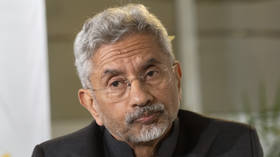Colonial legacy: Modi government may tighten sedition law enacted by British in India more than 150 years ago

The 279th report of the 22nd Law Commission to India’s Ministry of Law and Justice has recommended the retention of sedition in Article 124A of the Indian Penal Code (IPC), which was enacted over 150 years ago during British colonial rule in India.
While critics denounce the law for its colonial nature and its misuse, the Law Commission has proposed harsher punishment, citing the country's growing security challenges.
Arguments in favor of a stricter law
On May 24, the executive body, headed by retired judge Ritu Raj Awasthi, proposed that the non-bailable punishment for sedition be increased from a maximum jail term of three years to imprisonment for up to seven years, while retaining the possibility of a life sentence or fine.
The report dismissed demands for the repeal of the colonial-era law.
The panel, which is tasked with advising the Indian government on legal reforms, has stated that severe threats exist to India’s internal security – such as ethnic tensions and separatist movements – and the freedom of citizens can be protected only when the security of the nation is ensured.
It also mentioned the role of social media in “proliferating and propagating radicalization” against the government and inciting hatred at the “initiation and facilitation of foreign powers” in a veiled dig at India’s arch-enemy and nuclear-armed western neighbor, Pakistan. India’s other neighbor, China, also falls in a similar category.
In this context, the report stated that sedition was a “reasonable restriction” under Article 19 (2) of the Indian constitution.
“Laws like the Unlawful Activities Prevention Act (UAPA), 1967, and National Security Act (NSA), 1980, are special laws that seek to prevent the commission of offenses targeted towards the nation. The law of sedition seeks to prevent the violent, illegal and unconstitutional overthrow of a democratically elected government established by law. Other laws contain much more stringent provisions,” it said.
According to the commission, the fact that the law dates from “colonial times” is not a “valid ground” for its repeal.
“If sedition is considered to be a colonial-era law, then by that virtue, the entire framework of the Indian legal system is a colonial legacy. The mere fact that a legal provision is colonial in its origin does not ipso facto validate the case for its repeal,” it explained.
“Every country has to grapple with its own set of realities and the sedition law should not be repealed merely because other countries have done so,” the report added.
The panel also made certain recommendations regarding amendments to the provision, including mandatory preliminary investigation, procedural safeguards, and revision of punishment.
Arguments against the law
India’s right-wing Bharatiya Janata Party (BJP), led by Prime Minister Narendra Modi, has been accused by eminent lawyers and journalists’ bodies of silencing the shrinking space for dissent against the government.
Kapil Sibal, a former Congress leader, an ex-federal minister and one of the leading legal voices in the country, described the report as a betrayal by the Modi government.
Similarly, the Committee to Protect Journalists (CPJ) has raised concerns regarding the panel’s recommendations.
The critics are worried about the misuse of the law because it can be invoked randomly by the government to combat dissent if “any person by words, either spoken or written, or by signs, or by visible representation, or otherwise, brings or attempts to bring into hatred or contempt, or excites or attempts to excite disaffection towards the government established by law in India.”
The recommendations have been slammed for aiming to serve the interests of the Modi government ahead of next year’s crucial parliamentary election, in which the BJP will be seeking a third consecutive term.
Though the critics are going hammer and tongs against the government, the ground realities suggest the Modi administration is in favor of “shedding the colonial baggage” such as this controversial law.
In an affidavit filed to the country’s Supreme Court last year, the government made its intention abundantly clear. “We need to, as a nation, work even harder to shed colonial baggage that has passed its utility, which includes outdated colonial laws and practices,” raising hopes of putting an end to the harsh law.
The Supreme Court order, which was issued on May 11, 2022, kept in abeyance all pending trials, appeals and proceedings concerning charges brought under the sedition law.
The timing of the report
The report has been submitted at a time when India’s human-rights record has become a global talking point.
The recommendations have also queered the pitch for the Supreme Court. It has been looking into the merits of the judgment in an old case – Kedar Nath Singh vs State of Bihar (1962) – in which the provisions of the colonial-era law were upheld amid plans to revisit the contentious verdict.
The report also failed to take into account two judgments in the past few years that are germane to this contentious law. These include the Supreme Court verdict in the Shreya Singhal (2015) case, which struck down Section 66A of the Information Technology Act.
Also, the top court’s Constitution Bench judgment in the Kaushal Kishor case (2023), dealing with the free-speech rights of public functionaries, was conspicuous by its absence.
Exponential rise in sedition cases
Data shows that, of the nearly 11,000 people charged in 816 sedition cases since 2010, 65% were charged since Prime Minister Modi came to power in 2014 .
Altogether, 405 Indians have been accused of sedition for criticizing politicians and governments in the past decade, of which 95% were charged after 2014. Of these, 149 were accused of making “critical” or “derogatory” remarks against Modi and 144 against Uttar Pradesh Chief Minister Yogi Adityanath.
The data shows a 28% rise in sedition cases filed annually between 2014 and 2020, as compared to the yearly average of the previous United Progressive Alliance (UPA) administration between 2010 and 2014.
The BJP was in power in four of the five states with the highest number of sedition cases between 2010 and 2020, including Bihar, Uttar Pradesh, Karnataka, and Jharkhand. In Uttar Pradesh, 77% of the 115 cases of sedition registered since 2010 were lodged after Adityanath became the chief minister in 2017.
Tamil Nadu is the only non-BJP-ruled state in the top five, recording 139 sedition cases since 2010. However, approximately 80% of these cases were lodged against those opposing the construction of the Kudankulam Nuclear Power Plant in the southern state.
In 2021, eminent journalist Sashi Kumar moved a plea in the Supreme Court, citing persons who have been booked under the anti-sedition provision for allegedly criticizing the government, such as climate activist Disha Ravi, journalist Vinod Dua, filmmaker Aisha Sultana, and student Amulya Leona.
The law was used to book activists during the protest against the Citizenship (Amendment) Act, 2019 (CAA). It was also invoked against the accused in the 2018 Bhima Koregaon case.
However, delays meant that only seven people in 12 cases were convicted between 2015 and 2020, according to statistics compiled by the National Crime Records Bureau (NCRB).
In the recent past, the Modi government has buckled under popular pressure. Consider the sustained agitation by farmers that led to the repeal of agricultural laws.
Historical origin of the ‘draconian’ law
The law was first introduced in clause 113 of Thomas Babington Macaulay’s Draft IPC in 1837. However, when the IPC was finally enacted in 1860 after a 20-year delay, the section pertaining to sedition was mysteriously omitted, according to a study.
The need to introduce the law of sedition was first recognized by the British after the revolt of 1857 by the Indian “sepoys” or soldiers. It was therefore incorporated under Section 124A of the IPC on November 25, 1870.
The IPC (Amendment) Act, 1898 amended Section 124A, making the act of bringing or attempting to bring hatred or contempt (besides disaffection) towards the established government punishable. The law retained the same form, even after India gained independence from the British in 1947.
Indian freedom fighters, Bal Gangadhar Tilak and Mohandas Karamchand Gandhi – known as the Father of the Nation – were among its most famous victims.
Gandhi referred to the law as “the prince among the political sections of the IPC designed to suppress the liberty of the citizens.”
During the colonial era, the law imposed a life sentence on “those who by words, either spoken or written or by signs, visible representation or otherwise brought or attempted to bring hatred or contempt or excitement or attempted to excite disaffection” towards British rule in a bid to criminalize dissent. In 1897, Tilak was prosecuted for sedition for his views published in “Kesari,” a Marathi newspaper that he published. Tilak had argued that “in Europe, the actions of Caesar, Napoleon and French revolutionaries were seen as necessary agents of progress whereas the native subject’s radicalism, in India, was reduced to mere savagery, a sign of his primitiveness.”
The law, which was amended to give judges discretion to impose a life sentence, fine, or a jail term of up to three years, was introduced following Tilak’s trial.
The Modi government’s stand
The panel’s report needs to be seen in light of developments in the past two years. In 2021, journalists Kishorchandra Wangkhem and Kamal Shukla, charged with sedition, filed petitions challenging Section 124A in the Supreme Court. Nine other petitions were filed by other groups and individuals, including the People’s Union for Civil Liberties (PUCL), Major General Sudhir Vombatkere, the Editors Guild of India, the Journalists Association of Assam, and former federal minister and editor Arun Shourie.
Indian Law Minister Arjun Ram Meghwal, who succeeded Kiran Rijiju last month, has refused to read too much into the Law Commission’s recommendations. He said they were “persuasive” but “not binding,” and that a final decision would be taken after consulting all stakeholders.



















